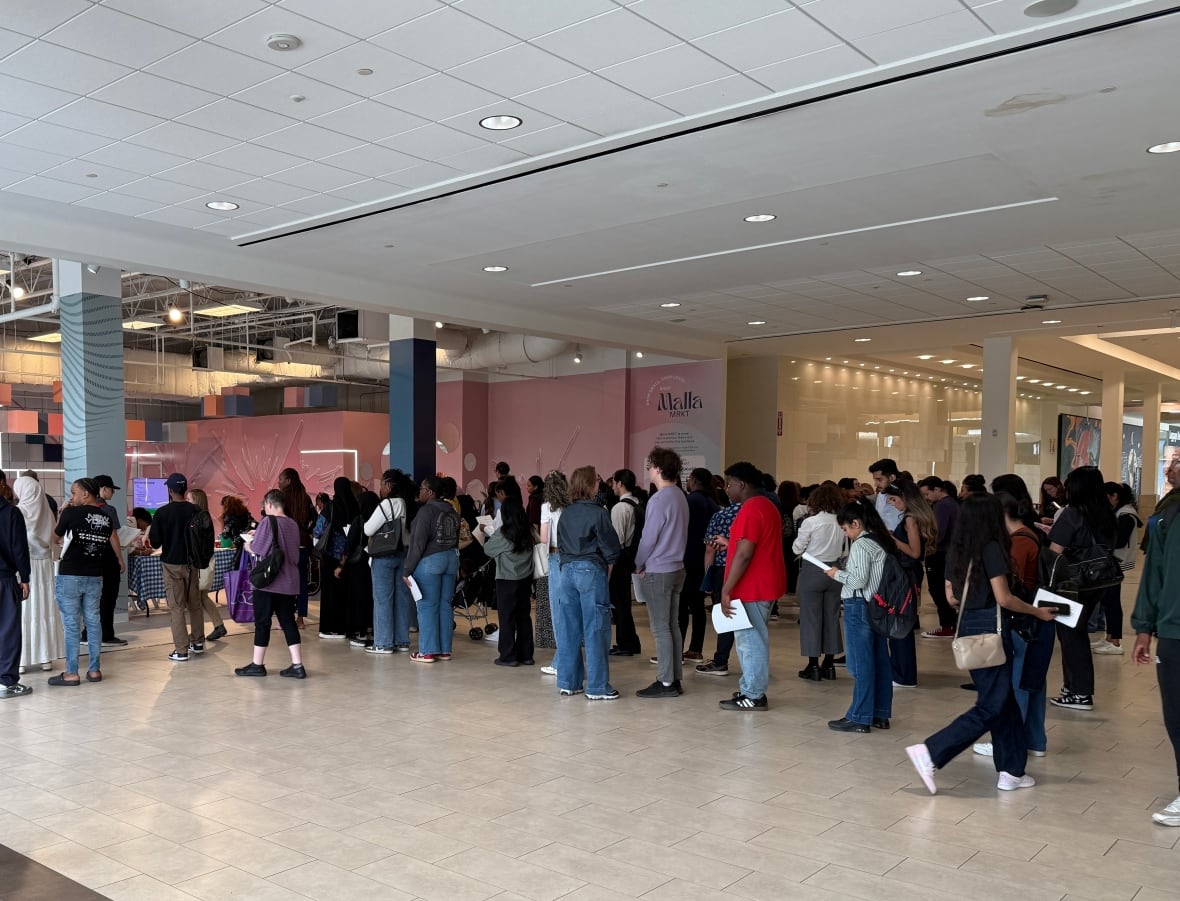For 19-year-old Everett Goodridge, the search for a job has been defined by rejection — especially coming out of high school.
He’s soberly aware of the competition he’s up against, one face in a long line of job-seekers at a job fair in Edmonton’s Kingsway Mall.
“I have a year or two of retail experience, and even with three years of looking for jobs, it just doesn’t seem to land me any opportunities,” Goodridge said.
“At this point, optimism is pretty far away.”
Looking for any job he can get, he’s hoping to score a gig and save some money for post-secondary education, with dreams of enrolling in a forensics program. For now, he has applied for a job with a private security company.
 A job fair at Kingsway Mall on Sept. 4 attracted a crowd of young job-seekers, resumes in hand. It comes as the latest Statistics Canada numbers show Alberta suffered some of the largest job losses in the country in August. (Travis McEwan/CBC)
A job fair at Kingsway Mall on Sept. 4 attracted a crowd of young job-seekers, resumes in hand. It comes as the latest Statistics Canada numbers show Alberta suffered some of the largest job losses in the country in August. (Travis McEwan/CBC)
Goodridge’s story is one of many, as Alberta faces some of the largest job losses in the country, new Statistics Canada data shows. Excluding the two peak years of the COVID-19 pandemic, Alberta’s unemployment rate is the highest it’s been since August 2017.
The picture is even more stark for youth: the unemployment rate for returning students in Canada, aged 15 to 24, averaged almost 18 per cent this summer — the highest since since 2009.
In Alberta, almost one in four returning students never found a job this summer, data shows.
“The market is competitive, there are a lot of job seekers,” said David Blackburn, a senior manager with Prospect Human Services, an Edmonton non-profit dedicated to helping people get hired.
Blackburn helped organize the Kingsway job fair to connect mall retailers with job seekers. Over the last few years, he said, young people looking to get their foot in the door have faced a lot of challenges.
He recalled being able to get a job at McDonald’s as a teenager. But now, he said, many fast food restaurants are looking for people over 18.
“It’s not that easy today,” he said.
LJ Valencia, economist with Desjardins Group, coauthored a report by Desjardins released Thursday. It argues the rise of gig work, artificial intelligence and rapid population growth are all hurting job prospects for Canada’s youngest workers.
“Part of it is that the economy has been slowing down for quite some time — and even more so now, especially with this trade war that we have with the United States,” Valencia said.
“We’ve seen a huge amount of population growth over the past three years, and a lot of newcomers in our country also tend to fall into the much younger age group.”
WATCH | Why youth unemployment is surging: 
Why youth unemployment is surging in Canada and Alberta
Alberta is getting $3.1 billion from a national settlement reached from tobacco companies. Advocates want the province to use the money for tobacco cessation programs, screening and cancer care. As Michelle Bellefontaine reports, the province has other plans.
Prolonged periods of unemployment can impact earnings potential, career development and networking opportunities for the future of the workforce, he said.
The report also outlines that, while governments have introduced programs aimed at improving things for young people, more needs to be done.
“Stronger integration between various levels of government, as well as between governments, post-secondary institutions and employers, could give Canadian youth more of the training and early experience they need to succeed in today’s labour market,” it reads.
A spokesperson for the Alberta Ministry of Jobs, Economy, Trade and Immigration told CBC News that it will be investing in youth employment initiatives in the coming days.
In a similar vein to federal Conservative Leader Pierre Poilievre’s calls to end the temporary foreign worker program, the Alberta government has also pointed to Ottawa’s approach to immigration.
“Instead of focusing on economic immigration, the federal government opened the floodgates for non-permanent residents to unsustainable levels,” it read.
“Combine this with Alberta’s growing population, and nation-leading interprovincial migration, and the result is an extremely competitive job market for youth.”

